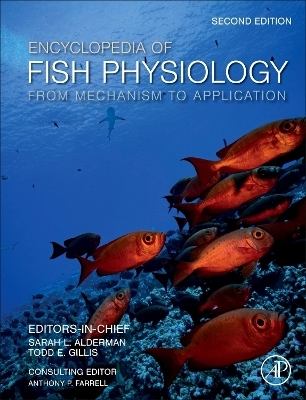
Encyclopedia of Fish Physiology
Academic Press Inc
978-0-323-90801-6 (ISBN)
Dr. Sarah Alderman received a PhD in Zoology from the University of Guelph, Canada, where her research investigated the molecular regulation of the endocrine stress response in teleost fish. Following post-doctoral studies at the Universities of Waterloo and British Columbia, Canada, she is now Assistant Professor in the Department of Integrative Biology at the University of Guelph. Dr. Alderman’s research program uses advanced molecular and cytological approaches to study how environmental stressors affect the form and function of vertebrates, including the mechanisms that regulate adult neurogenesis in zebrafish and the physiological consequences of crude oil exposure in salmon. She is also pioneering the use of quantitative proteomics to identify novel bioindicators of stress exposure and organismal health for applications in fish management and conservation. Dr. Alderman is a member of the Editorial Board for the peer-reviewed journal Aquatic Toxicology, was formerly an Editorial Reviews Consultant and an Outside JEB columnist for the peer-reviewed Journal of Experimental Biology, and is an active member of the Canadian Society of Zoologists and the Society for Experimental Biology. Dr. Todd Gillis was educated in Canada at the University of Guelph (BSc, MSc) and Simon Fraser University (PhD). His PhD thesis focused on the mechanisms that enable cardiac function in rainbow trout at their comparatively low physiological temperature. As a Natural Sciences and Engineering Research Council (NSERC) Post-Doctoral Fellow at the University of Washington, he studied the role of the thin filament in controlling cardiac function. Dr Gillis’ research program, funded by NSERC, and Fisheries and Oceans Canada is focused on the vertebrate heart and the mechanisms that regulate its function, and capacity to respond to environmental and pathological stressors including temperature change, hypoxia, injury, and oil exposure. This work utilizes an integrative approach that is linking changes in gene and protein expression to cellular and tissue function to whole animal responses. Dr. Gillis is an Associate Editor of the Journal of Comparative Physiology B and on the Editorial Boards of the Journal of Thermal Biology, Comparative Biochemistry and Physiology A, and Current Research in Physiology.
The Encyclopedia is structured in 3 volumes with 4 major sections that group topics and chapters thematically. This mirrors the structure of the first edition, but some topics have been reorganized and some new topics introduced. * indicates a change from the original edition.
Volume 1: The Senses, Integrating Systems*, Behaviour, and Reproduction – this volume is about how fish interface with the world - Sensing the Environment e.g. the brain and nervous system, vision, hearing and the lateral line, electroreception, olfaction - Endocrine and Immune* Systems e.g. introduction to major hormone systems and their role in regulating physiological processes - Behavioural Physiology e.g. predator/prey, reproductive behaviours*, dominance, schooling*, sleep, communication* - Reproduction e.g. reproductive strategies*, sex differentiation, early development*
Volume 2: Gas and Ion Exchange, Circulatory System, Energetics*, and Movement* – this volume is about how fish function internally - Gas Exchange and Ion homeostasis e.g. respiration, osmoregulation, acid/base balance, structure and function of the gills and kidneys - The Heart, Vasculature, and Blood e.g. comparative morphology, regulation of heart function, retes, blood cells, Root effect - Energy Homeostasis e.g. food intake, digestive system, metabolism, excretion - Muscles and Movement e.g. musculoskeletal system, biomechanics of swimming, locomotion, migration
Volume 3: Adaptations, Specializations, and Applications – this volume establishes the importance of fish physiology by placing it in the context of other disciplines - Responses and Adaptations to the Environment e.g. hypoxia, thermal acclimation, seawater transition, bioluminescence - Life in Extreme Environments* e.g. complete darkness (cavefish), subzero temperature (icefish), alkaline lakes (cichlids), intertidal fish - Physiological Specializations of Different Fish Groups e.g. deep sea fish, air-breathing fish, elasmobranchs - Applications of Fish Physiology e.g. biomedical applications (neuroscience*, regeneration*, disease models), food science* (aquaculture; petri dish sushi), toxicology, climate change*, conservation physiology*
| Erscheint lt. Verlag | 19.3.2024 |
|---|---|
| Mitarbeit |
Chef-Herausgeber: Sarah L. Alderman, Todd E. Gillis |
| Zusatzinfo | Approx. 1300 illustrations (1300 in full color); Illustrations |
| Verlagsort | Oxford |
| Sprache | englisch |
| Maße | 216 x 276 mm |
| Gewicht | 450 g |
| Themenwelt | Schulbuch / Wörterbuch ► Lexikon / Chroniken |
| Naturwissenschaften ► Biologie ► Limnologie / Meeresbiologie | |
| Naturwissenschaften ► Biologie ► Zoologie | |
| Weitere Fachgebiete ► Land- / Forstwirtschaft / Fischerei | |
| ISBN-10 | 0-323-90801-2 / 0323908012 |
| ISBN-13 | 978-0-323-90801-6 / 9780323908016 |
| Zustand | Neuware |
| Informationen gemäß Produktsicherheitsverordnung (GPSR) | |
| Haben Sie eine Frage zum Produkt? |